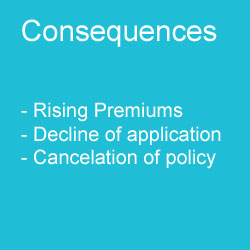It is never a good idea; I know many use the cliché and take comfort in the fact that others have done it before them, but it is a sure way of placing your future and that of your family in jeopardy. Why should you lie in the first place? Do not be lied to, as far as life insurance is concerned, it will cost you more to lie than to tell the truth.
Why is telling the truth important?
Life insurance is an important subject, and you should treat it as such. It is the shoulder your family or relatives are to lean on if and when the worst happens. Lying to insurance firms is mainly considered as non-disclosure since it encompasses the withholding of crucial information that is relevant to the cover you are asking for.
It leads you on into a false sense of security that evaporates immediately the insurance firm unearths the truth behind the deceit.
The penalty for non-disclosure is usually the voiding of the insurance cover and what anguish it will be for your family to experience a double salvo of losing you and the insurance cover in the same wavelength. Lying, or in a technical term, non-disclosure; gets you a worthless cover since it can lead to the cancellation of your death benefits.
It leads you on into a false sense of security that evaporates immediately the insurance firm unearths the truth behind the deceit.
Why do people lie on insurance forms?
You have probably interacted with friends and colleagues who have lied to insurance firms at one point or another. The most common reason that they give for lying is that they wish to have the premium amount reduced so that they submit fewer amounts. What you should know about this is the fact that it endangers the full cover insurance once the worst happens.
The other popular reason that you have probably heard of is the one on lying to increase the chances of approval. You may want to appear perfect in the eyes of the insurance firm for them to approve but what you do not realise is that the imperfect aspects always have a way of coming out.
What do people lie about?
Every bit of information that an insurance company asks you to fill out is important. Lying about any of them can easily discredit you and initiate avoiding of the cover. The factors that you may be tempted to overlook and lie about include;
• Drug use history
• Terminal illness history
• Income situation
• Tobacco uses both present and past

Most insurance brokers lie to you that the information in the forms can be filled at your own discretion but what you should know is that they are normally there to sell you the cover and be gone. The consequences for the answers you give are therefore left to you to deal with alone. This should be the cue that should give you the perspective to tell the truth and eliminate the nagging feeling of doubt as far as your insurance cover is concerned.
What you should realize is that insurance firms usually contract third party companies and investigators to get the information they need to authorize a cover. Sources of information like Medical Information Bureau and Credit Reports give an account of your health and financial situation respectively.
The consequences of telling a lie on your life insurance application are dire and range from raising premiums, a decline of application, reduction of benefits or worse the cancelation of the insurance cover. You can find out more about insurance cover and how to avoid making the error of falsifying information in your application by contacting through email or call to get your application right.
